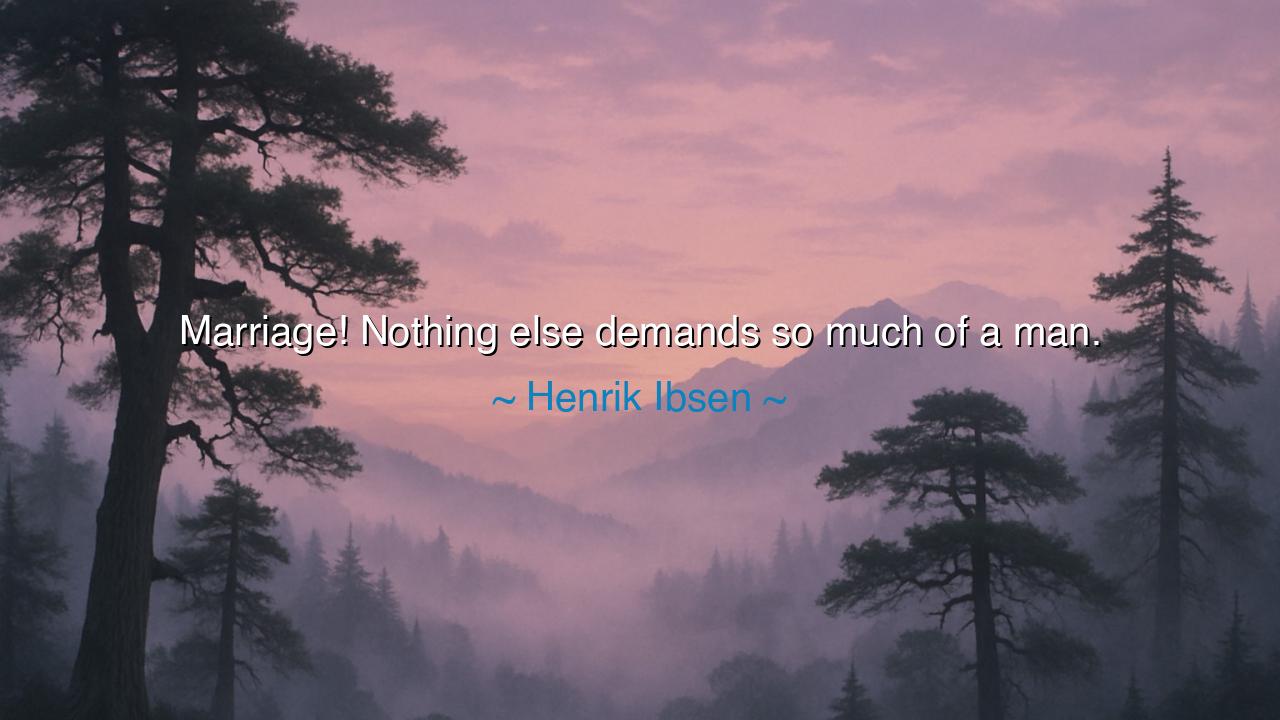
Marriage! Nothing else demands so much of a man.






Hear now the solemn cry of Henrik Ibsen, the dramatist who pierced the illusions of society with words like blades: “Marriage! Nothing else demands so much of a man.” In this exclamation lies both wonder and warning. For Ibsen, who wrote of broken households and silenced women, understood that marriage is not a light ornament, nor a simple joy, but a weighty covenant that tests the deepest fibers of a man’s character. It is the crucible in which his patience, humility, strength, and compassion are melted and remade.
The meaning of this saying is plain, yet profound. A man may face battles in the marketplace, or wars upon the battlefield, but these are moments of conflict, visible and fleeting. Marriage, by contrast, is a daily labor, unseen and unending. It calls upon him to sacrifice his own will, to master his temper, to labor not for himself alone but for another, and perhaps for the children born of the union. It demands endurance in times of want, gentleness in times of conflict, and steadfastness when passion wanes. Truly, nothing else demands so much of his soul and spirit.
The origin of Ibsen’s insight lies in his plays, where he exposed the hypocrisies of domestic life. In “A Doll’s House,” he showed the suffocating expectations placed on both husband and wife. Torvald, the husband, believed marriage to be a stage for his authority, yet when tested, his weakness was revealed. Nora, his wife, abandoned the household to seek truth for herself. Here Ibsen displayed that marriage was not a casual plaything, but a severe mirror in which men must face who they truly are. For in the intimacy of marriage, masks fall away, and a man is revealed not as society sees him, but as his spouse and family know him.
History too bears testimony. Consider Marcus Aurelius, emperor and Stoic philosopher. Though ruler of Rome, he confessed that his greatest struggles were not against barbarian tribes but in balancing duty to empire with devotion to his wife and children. His meditations reveal the strain of marriage: the need to govern not only a nation but one’s household, not only others but one’s self. His greatness did not lie in power alone, but in the humility and patience demanded within the walls of his home.
Yet let us not mistake Ibsen’s words for lament alone. To say that marriage demands much is also to say that it shapes greatness. A man who submits to its discipline is refined, like iron in the forge. He learns to give, to endure, to rise beyond selfishness. He learns that true power is not domination but service, not pride but humility. In giving of himself, he gains strength of character that no battlefield or throne could ever bestow. Marriage is thus both burden and blessing: it crushes the shallow man but builds the noble one.
O children of tomorrow, learn from this: do not enter marriage lightly. Do not believe it will be sustained by passion alone. Know that it is a lifelong labor, demanding more of you than any profession, any war, any journey. Enter it with reverence, with readiness to sacrifice, with the courage to be changed. For marriage will strip you of illusion and summon forth the truth of your character.
What then must you do? If you are called to marriage, prepare yourself as for battle—not against your spouse, but against your own selfishness. Arm yourself with patience, discipline, and kindness. See your partner not as a possession but as a fellow laborer in the great work of life. And if you endure faithfully, your marriage shall not be a prison but a triumph, a place where two souls rise higher together than either could alone.
Thus, Ibsen’s words endure: “Marriage! Nothing else demands so much of a man.” It is both warning and promise. For though it demands all, it gives in return the highest of human blessings: companionship, legacy, and the refining of the soul into something greater than itself.






AAdministratorAdministrator
Welcome, honored guests. Please leave a comment, we will respond soon